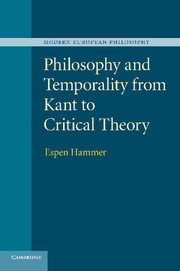Book contents
- Frontmatter
- Contents
- Acknowledgments
- Introduction
- 1 The historicity of time
- 2 Modern temporality
- 3 Two responses to the time of modernity
- 4 Hegel's temporalization of the absolute
- 5 Schopenhauer and transcendence
- 6 Time and myth in the early Nietzsche
- 7 Recurrence and authenticity: the later Nietzsche on time
- 8 Heidegger on boredom and modernity
- 9 A modernist critique of postmodern temporality
- Conclusion
- Bibliography
- Index
Conclusion
Published online by Cambridge University Press: 21 April 2011
- Frontmatter
- Contents
- Acknowledgments
- Introduction
- 1 The historicity of time
- 2 Modern temporality
- 3 Two responses to the time of modernity
- 4 Hegel's temporalization of the absolute
- 5 Schopenhauer and transcendence
- 6 Time and myth in the early Nietzsche
- 7 Recurrence and authenticity: the later Nietzsche on time
- 8 Heidegger on boredom and modernity
- 9 A modernist critique of postmodern temporality
- Conclusion
- Bibliography
- Index
Summary
In 1940, John Dewey wrote:
The uncertainty of life and one's final lot has always been associated with mutability, while unforeseen and uncontrollable change has been linked with time … In the late eighteenth and the greater part of the nineteenth centuries appeared the first marked cultural shift in the attitude taken towards change. Under the names of indefinite perfectibility, progress, and evolution, the movement of things in the universe itself and of the universe as a whole began to be take on a beneficial instead of a hateful aspect … Aside from the Christian idea of a millennium of good and bliss to be finally wrought by supernatural means, the Golden Age for the first time in history was placed in the future instead of at the beginning, and change and time were assigned a benevolent status.
Much of this book has been about precisely this shift – its implications and consequences, and in particular the hypothesis that the fear of contingency, uncertainty, and death, which I have examined in terms of the problems of meaning and transience, did not go away with secularization but were in fact exacerbated by what Dewey calls “the acceptance of change.” The focus throughout has been on the philosophical ramifications of the transition, instigated and perpetuated by modernity and modernization, from a world in which the conception of timeless essence over and above human history enjoyed undisputed authority to a world dominated by the complete historicization of all being.
- Type
- Chapter
- Information
- Philosophy and Temporality from Kant to Critical Theory , pp. 236 - 242Publisher: Cambridge University PressPrint publication year: 2011

